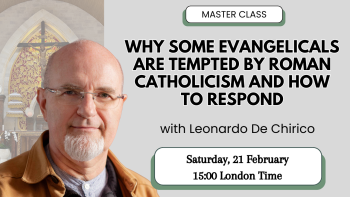Since the 20th century, when a ‘conversion story’ was heard, it would typically be one from Roman Catholicism to Evangelicalism. While this is still the case on a global scale, the reverse direction is gaining momentum. In the theological world, Dr. Albert Mohler warned evangelicals about the ‘temptation’ of Roman Catholicism at the 2021 Presidential address to the Evangelical Theological Society. It is important to understand what is happening and how to respond biblically.
1. ‘Why Do They Cross the Tiber?’: Setting the Stage
In recent decades, there have been some ‘conversions’ of well-known evangelicals to Roman Catholicism—from Thomas Howard in 1985 to Francis Beckwith in 2007, followed by significant numbers of younger intellectuals attracted to Rome. The question is ‘why’?
2. ‘To Be Deep in History Is to Cease to Be Protestant’: The Allure of Tradition
People like John Henry Newman were drawn to the Catholic Church because of its deep historical roots and ties to early Christianity. This appeals to many who find Protestant worship too focused on intellectual aspects, seeing in Catholic worship a more complete and engaging religious experience.
3. ‘Too Smart to Be a Protestant’: The Intellectual Attraction
Cultural engagement is strong with Roman Catholicism, and therefore renders it ‘relevant’. Converts to Rome often seek to resolve this struggle by embracing the magisterial authority of the Catholic Church, which promises doctrinal and ethical certainty.
4. ‘Shallow and Consumerist Worship’: The Liturgical Challenge
Some Protestants feel that their tradition lacks depth, whether that be with the way a tradition practices the Lord’s Supper (or how little they practice it) or when it comes to engaging culture and the arts. The sacramental system and physical aspects of Catholic worship, such as the consecrated host (bread) and beautiful cathedrals, provide a tangible sense of connection to God. Many forms of Protestantism seem to have a disenchanted view of the world, separating symbols from reality. Roman Catholicism, on the other hand, holds up its rich sacramental tapestry and historical engagement with the arts.
5. Recovering Biblical Christianity: The Evangelical Antidote to Rome
The session will suggest ways to recover an evangelical awareness of its history, which is grounded in the Bible and in continuity with the historical church. Of course, modernity has influenced the present outlook of Evangelicalism, but its doctrinal and spiritual shape has always been marked by the constant recovery and appreciation of the original (and therefore biblical and ancient) form of Christianity. Christian antiquity and historical legacies must be nurtured in connection with the fact that each evangelical congregation is part of the ‘catholic” church and the present-day global church. Cultivating this dimension of the evangelical faith will give antidotes to the allures of Rome.

